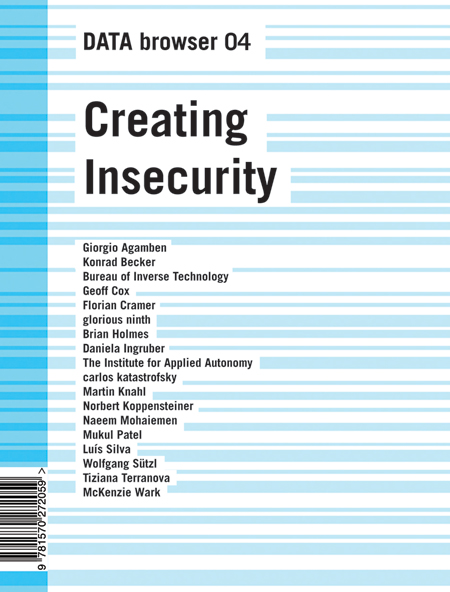Mary Joyce (ed.): Digital Activism Decoded: The New Mechanics of Change (2010)
Filed under book | Tags: · activism, internet, labour, media activism, politics, social movements, society, technology, web

Citizens around the world are using digital technologies to push for social and political change. Yet, while stories have been published, discussed, extolled, and derided, the underlying mechanics of digital activism are little understood. This new field, its dynamics, practices, misconceptions, and possible futures are presented together for the first time in Digital Activism Decoded.
With contributions by Trebor Scholz, Dan Schultz and Andreas Jungherr, Brannon Cullum, Katharine Brodock, Tom Glaisyer, Anastasia Kavada, Tim Hwang, Steven Murdoch, Dave Karpf, Simon Columbus, Rasmus Kleis Nielsen, Sem Devillart, Brian Waniewski
Preface and Introduction by Mary Joyce
Published by International Debate Education Association, New York & Amsterdam, 2010
Creative Commons Attribution Non-Commercial License US 3.0
ISBN 9781932716603
240 pages
interview (Richard MacManus, ReadWriteWeb)
Comment (0)Charles Babbage: On the Economy of Machinery and Manufactures (1832/2010)
Filed under book | Tags: · engineering, labour, machine, mathematics, technology

“In this famous book, first published in 1832, Charles Babbage (1791–1871), the mathematician, philosopher, engineer and inventor who originated the concept of a programmable computer, surveys manufacturing practices and discusses the political, moral and economic factors affecting them. The book met with hostility from the publishing industry on account of Babbage’s analysis of the manufacture and sale of books. Babbage describes the many different printing processes of the time, analyses the costs of book production and explains the publication process, before discussing the ‘too large’ profit margins of booksellers. Babbage succeeded in his aim ‘to avoid all technical terms, and to describe in concise language’, making this an eminently readable historical account. His analysis and promotion of mechanisation and efficient ‘division of labour’ (still known as the ‘Babbage principle’) continue to resonate strongly for modern industrial engineering.”
Originally published by Charles Knight, Pall Mall East., London, 1832
Publisher Cambridge University Press, 2010
Cambridge Library Collection – Printing and Publishing History
ISBN 1108009107, 9781108009102
344 pages
PDF (5 MB, updated on 2014-12-22)
Comment (0)Wolfgang Sützl, Geoff Cox (eds.): Creating Insecurity: Art and Culture in the Age of Security (2009)
Filed under book | Tags: · art, biopolitics, floss, free software, internet, knowledge, labour, open source, security, software, technology

“Today we are facing extreme and most dangerous developments in the thought of security. In the course of a gradual neutralization of politics and the progressive surrender of traditional tasks of the state, security imposes itself as the basic principle of state activity. What used to be one among several decisive measures of public administration until the first half of the twentieth century, now becomes the sole criterion of political legitimation. The thought of security entails an essential risk. A state which has security as its sole task and source of legitimacy is a fragile organism; it can always be provoked by terrorism to become itself terrorist.
Following the words of Giorgio Agamben (from his 2001 article “On Security and Terror”), security has become the basic principle of international politics after 9/11, and the “sole criterion of political legitimation.” But security — reducing plural, spontaneous and surprising phenomena to a level of calculability — also seems to operate against a political legitimacy based on possibilities of dissent, and stands in clear opposition to artistic creativity. Being uncalculable by nature, art is often incompatible with the demands of security and consequently viewed as a “risk,” leading to the arrest of artists, and a neutralization of innovative environments for the sake of security.
Yet precisely the position of art outside the calculable seems to bring about a new politicization of art, and some speak of art as “politics by other means.” Has art become the last remaining enclave of a critique of violence? Yet how “risky” can art be?”
Contributions from Giorgio Agamben, Konrad Becker, Bureau of Inverse Technology, Geoff Cox, Florian Cramer, glorious ninth, Brian Holmes, carlos katastrofsky, Martin Knahl, Norbert Koppensteiner, Daniela Ingruber, The Institute for Applied Autonomy, Naeem Mohaiemen, Mukul Patel, Luis Silva, Wolfgang Sützl, Tiziana Terranova, and McKenzie Wark.
Publisher Autonomedia/I-DAT, 2009
Creative Commons license
DATA browser series, 4
ISBN 9781570272059
208 pages
PDFs (updated on 2016-12-12)
Comment (0)
